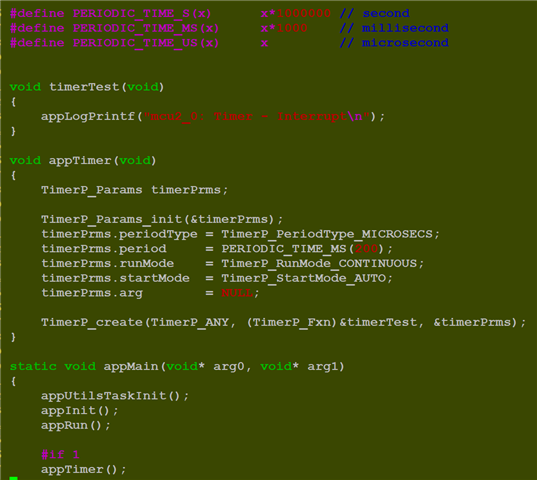Part Number: TDA4VM
Hi team,
SDK: Processor SDK RTOS J721E 08_06_01
1) If the customer want to adjust the time period, are there any requirements other than using TIMERPreScalerClkEnable?
static void csldmTimerTest_Stub(uintptr_t arg)
{
uint32_t baseAddr = (uint32_t) (CSL_TIMER12_CFG_BASE);
//TIMERPreScalerClkEnable(CSL_TIMER12_CFG_BASE, TIMER_PRESCALER_CLK_DIV_BY_256);
/* Disable the Timer interrupts */
TIMERIntDisable(baseAddr, TIMER_INT_OVF_EN_FLAG);
/* acknowledge the interrupt */
TIMERIntStatusClear(baseAddr, TIMER_IRQSTATUS_OVF_IT_FLAG_MASK);
printf("Timer Interrupt\n");
/* Enable the Timer interrupts */
TIMERIntEnable(baseAddr, TIMER_INT_OVF_EN_FLAG);
}
static int32_t csldmTimer_registerTimerInt(void)
{
int32_t testStatus;
OsalInterruptRetCode_e retVal;
OsalRegisterIntrParams_t interruptRegParams;
/* Initialize with defaults */
Osal_RegisterInterrupt_initParams(&interruptRegParams);
/* Populate the interrupt parameters */
interruptRegParams.corepacConfig.arg = (uintptr_t) CSL_TIMER12_CFG_BASE;
interruptRegParams.corepacConfig.name = NULL;
interruptRegParams.corepacConfig.isrRoutine = csldmTimerTest_Stub;
interruptRegParams.corepacConfig.triggerSensitivity = OSAL_ARM_GIC_TRIG_TYPE_HIGH_LEVEL;
interruptRegParams.corepacConfig.priority = 0xFU; // R5: 0-15
interruptRegParams.corepacConfig.intVecNum = CSLR_R5FSS0_CORE0_INTR_TIMER12_INTR_PEND_0; /* Host Interrupt vector */
interruptRegParams.corepacConfig.corepacEventNum = CSLR_R5FSS0_CORE0_INTR_TIMER12_INTR_PEND_0;
printf("Register interrupts\n");
/* Register interrupts */
retVal = Osal_RegisterInterrupt(&interruptRegParams,&(gdmTimerTest_HwiPHandle));
printf("retVal %d\n", retVal);
if (retVal == OSAL_INT_SUCCESS)
{
testStatus = CSL_APP_TEST_PASS;
}
else
{
testStatus = CSL_APP_TEST_FAILED;
}
return (testStatus);
}
static void appMain(void* arg0, void* arg1)
{
appUtilsTaskInit();
appInit();
appRun();
#if 1
appLogPrintf("mcu2_0: Task - start\n");
TIMERPreScalerClkEnable(CSL_TIMER12_CFG_BASE, TIMER_PRESCALER_CLK_DIV_BY_256);
csldmTimer_registerTimerInt();
while(1)
{
appLogWaitMsecs(100u);
appLogPrintf("mcu2_0: Task - appMain\n");
}
#else
appDeInit();
#endif
}
int main(void)
{
TaskP_Params tskParams;
TaskP_Handle task;
/* This is moved before the wait function as NDK comes up with BIOS
and looks for semaphore handle created by appEthFwEarlyInit() */
#ifdef ENABLE_ETHFW
appEthFwEarlyInit();
#endif
/* This is for debug purpose - see the description of function header */
StartupEmulatorWaitFxn();
OS_init();
TaskP_Params_init(&tskParams);
tskParams.priority = 8u;
tskParams.stack = gTskStackMain;
tskParams.stacksize = sizeof (gTskStackMain);
task = TaskP_create(&appMain, &tskParams);
//csldmTimer_registerTimerInt();
if(NULL == task)
{
OS_stop();
}
OS_start();
return 0;
}
2) If csldmTimer_registerTimerInt is started on appMain of Task, the Timer interrupt has an action, but Task is stuck (printf log in while does not output). However, if csldmTimer_registerTimerInt is started in main, Task can output normally (printf log within while).
The customer will then switch to TimerP.h and now work as expected. But why is there a problem with dmTimer with CSL?


Could you help check this case? Thanks.
Best Regards,
Cherry


